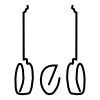This web page is dedicated to the proposition that understanding banjos is not difficult. In fact, it is dead easy. Hold that thought.
If you are a repeat visitor, and you have already read this drivel and just want to get to the links click [HERE].
On this page I have posted information about banjos that I find interesting. In some cases I have discovered the information myself, and in other cases I have found the information elsewhere, albeit in some obtuse or opaque form. In the latter cases I have attempted to provide simple explanations of things that seemed to be complex until I figured out what they really meant, after which they appeared to be easy.
Some of the pages show how to make simple adjustments or accessories for the banjo. Others show things that I have made. So it is an eclectic page.
The name of my web page comes from my attempts to simplify things that appear to be difficult or complex so that even I can understand them. The goal is to make the playing, building, and understanding the banjo Dead Easy. Even learning how to play it can be Dead Easy if taught properly. So this page has links to various other pages on my web site that chat about stuff concerning the banjo.
I am not selling anything. I did this just for fun. I hope that you find something to entertain you here.
Before we get to the links, I would like to point out my logo for Dead Easy Banjo. It looks like this:

It spells out the initials for Dead Easy Banjo (d e b) using my banjo logo. Pretty cool, huh? The logo appears at the bottom of every page, and if you click on it, you will come right back here, to this page.
OK. Now on to the links.
| I have started a project to build an Appalachian Dulcimer out of Mesquite wood. Mesquite is a very dense hardwood from Texas. It has unique properties, and is classified as a exotic wood. While it is an exotic wood, it is in no way endangered. In fact, because the tree grows thorns on its branches, it is pretty much hated by the ranchers down in Texas. It grows very fast, and it takes over large tracts of land. The ranchers tear it down and burn it in huge pyres. Recently, Mesquite has become a sought after material for floors and other applications. So if you want to to read about how dead easy it really is to build a dulcimer out of some of the toughest wood on the planet, click on Mesquite Dulcimer. |
| One of the most challenging parts of making a banjo from scratch is bending the wood for the hoop. Sure, you can just buy a hoop that was made in a factory. That is what a lot of the professional builders do. But then.... you didn't really make it, did you? Well, click on Bending Banjo Hoops to read about how dead easy it really is to bend your own hoop. Trust me. Would I lie to you? |
| Now that you have seen how I bent some wood into a banjo hoop, the next step is to build a banjo out of it. I am capturing my (mis)adventures for that project now, on Large Minstrel Banjo. I am starting this project in February of 2013. So if you are reading this a long time from now, it may be finished.... but probably not. Since this is an ongoing project, I will reserve judgement on how easy it was until I am done. |
| Did you ever wonder about how a curved bridge on a banjo can make the instrument play in tune better? No? Did you ever want to dive into some serious acoustic physics? No? Do you have any idea at all what I am talking about? No? Well click on The Compensated Bridge anyway to read about it. It isn't that hard if it is explained properly, and I have made it Dead Easy to understand. There are even some moving pictures on the web page. So take a leap and see what makes a banjo work. |
| Now that you know how the Moon Bridge works, ( you did read the info in the previous link, right? ) perhaps you want to stifle it a bit so that it won't be so loud. You might want to do that when practicing late at night, or when the neighbors begin hucking pinecones at you when you play while sitting on your deck. In either case, click on this link to see a Dead Easy way to make a mute for the Moon Bridge. |
| I don't use the finger picks much because I am always misplacing them. If I leave them in the case, it takes forever to fetch them out, so I don't bother. If I leave them on the table, the Pick Gremlins steal them away, and they are not there when I need them. So I started looking for a way to keep them with the banjo, hence the idea of using a Pick Bag. Of course, I am so cheap I could squeeze fertilizer out of a Buffalo Nickel, so I decided to make one myself. Click on this link to see a Dead Easy way to make a Pick Bag on a shoestring budget. |
| A good way to understand how a banjo is put together is to make one. So that is what I did. I wanted to try out a resonator banjo, but without shelling out the Big Bucks that those things sell for. So I built one from a kit. It wasn't really all that hard to build it.... well.... OK... there were some glitches along the way. Click here to see the whole story of How I Built a Goldtone Maple Classic Banjo. |
| Once I had built that resonator banjo and played it (well, I sort of played it...playing with the picks is still too hard for me), I got the bug to try my hand at playing a fretless banjo. I ended up building a minstrel banjo from a kit provided by Bob Flesher. That one was tricky... not hard, mind you, but a bit tricky. Click here to see what was tricky about it. How I Built a Bob Flesher Minstrel Banjo. |
